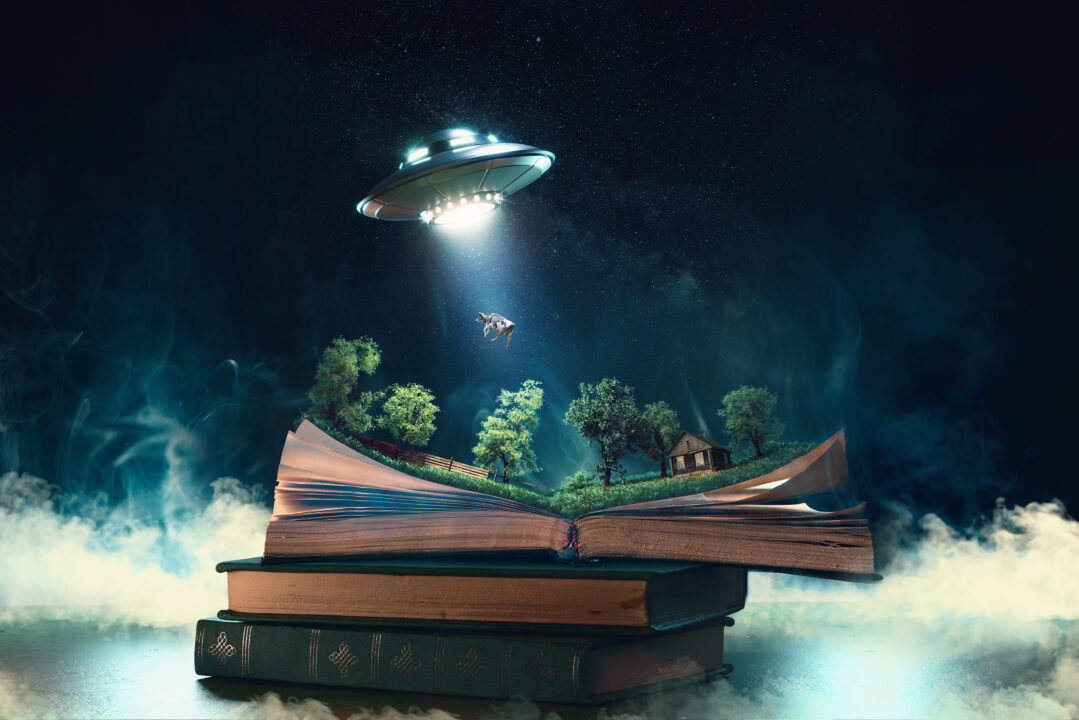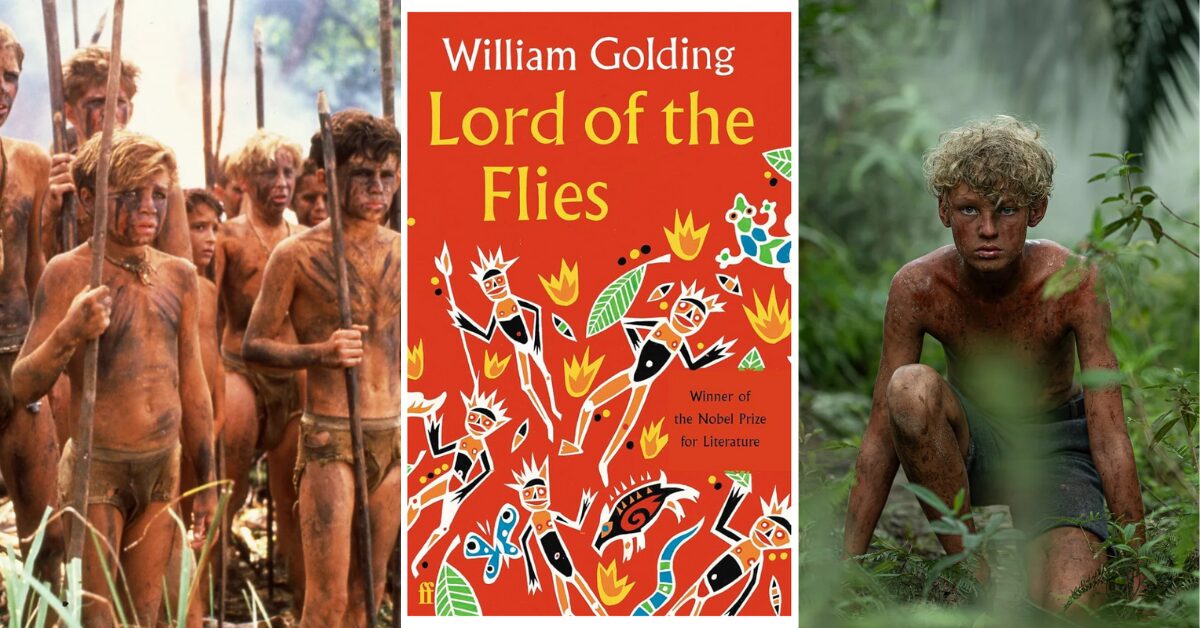In the vast expanse of literature, few popular book genres ignite the imagination quite like science fiction. The best sci-fi books offer more than just an escape; they present mind-bending possibilities, challenge our perspectives, and leave us in awe of the human spirit’s capacity to innovate.
From the prophetic narratives that have become eerily relevant to modern masterpieces that redefine the boundaries of the genre, these stories are beacons for those eager to explore the potential of the future.
Stay with us as we navigate the cosmos of celebrated works and unearth the pearls of the sci-fi universe. Let’s launch into an odyssey that will keep your curiosity brimming and your passion for reading alight.
Timeless Classics That Shaped the Genre
The foundations of science fiction are built upon groundbreaking novels that have not only stood the test of time but have also shaped the very fabric of the genre. These classics offer a blend of visionary ideas, profound themes, and rich storytelling that continue to captivate audiences and inspire new generations of writers.
1. George Orwell’s Dystopian Vision: “1984”
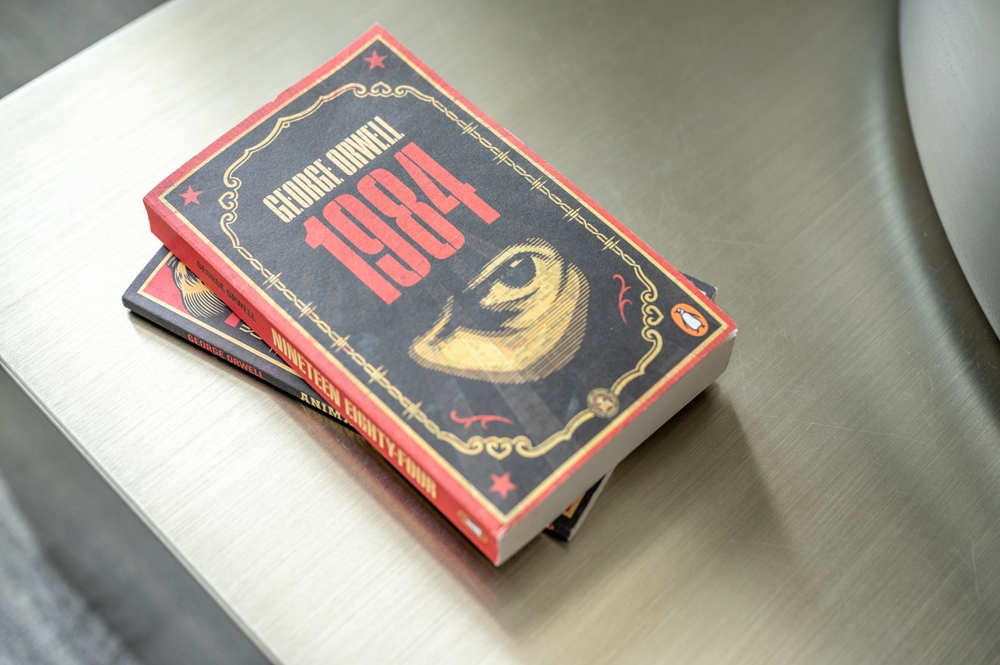
George Orwell’s “1984” is a chilling portrayal of a society ensnared by perpetual surveillance and oppressive totalitarianism. Its narrative is a profound forewarning of the dangers of unchecked authority and the erosion of individual freedoms.
Orwell’s vision resonates with alarming clarity in our contemporary world, where privacy concerns and political manipulation are ever-present discussions. This masterpiece remains a quintessential read for its stark, haunting depiction of a dystopian future that feels uncomfortably possible.
The book’s influence extends beyond the literary realm; it has permeated popular culture and political dialogues, prompting reflection on our own societal trajectory.
As we witness the protagonist navigate the bleak avenues of Airstrip One, Orwell invites readers to question the nature of truth, the power of language, and the price of conformity. “1984” remains a pivotal work that continues to challenge and enlighten those who traverse its pages.
2. The Enduring Legacy of “Dune” by Frank Herbert

Frank Herbert’s “Dune” is a monumental force in the realm of science fiction, a tome that weaves intricate politics, religion, and ecology into the tapestry of an alien desert world.
The saga of Paul Atreides and his ascent within the harsh climes of Arrakis has entranced readers for decades, offering a narrative as rich in detail as it is in scope. “Dune” not only birthed a universe brimming with complexity but also redefined the possibilities of world-building within the genre.
The novel’s themes of power, survival, and destiny resonate deeply with readers, making its mark as a thought-provoking epic that transcends the typical confines of space operas.
Herbert’s masterpiece is a testament to the enduring appeal of immersive storytelling, where each layer unveiled reveals a deeper understanding of the human condition amidst the backdrop of a meticulously crafted universe. It stands as a beacon for writers and readers alike, a pinnacle of speculative fiction that continues to inspire awe and admiration.
3. “A Scanner Darkly” by Philip K. Dick
Philip K. Dick’s “A Scanner Darkly” is a masterclass in psychological and philosophical exploration, set within the framework of a drug-fueled future that blurs the line between reality and paranoia.
The novel delves into the fragmented identity of an undercover narcotics agent as he descends into the abyss of Substance D, a drug that slowly dismantles the psyche. Dick’s storytelling is a labyrinth of twists and turns, each more disorienting than the last, compelling readers to confront the malleability of perception.
Through this harrowing tale, Dick raises poignant questions about the nature of self, addiction, and the societal constructs that bind us. His influence is evident in the multitude of films and books, such as the widely-discussed “Do Androids Dream of Electric Sheep?” that have adapted his concepts for new audiences.
“A Scanner Darkly” stands as a pulsing beacon in Dick’s repertoire, a testament to his ability to weave complex ideas into the fabric of gripping narratives.
4. Ursula K. Le Guin’s Groundbreaking Works: “The Left Hand of Darkness” and “The Dispossessed”
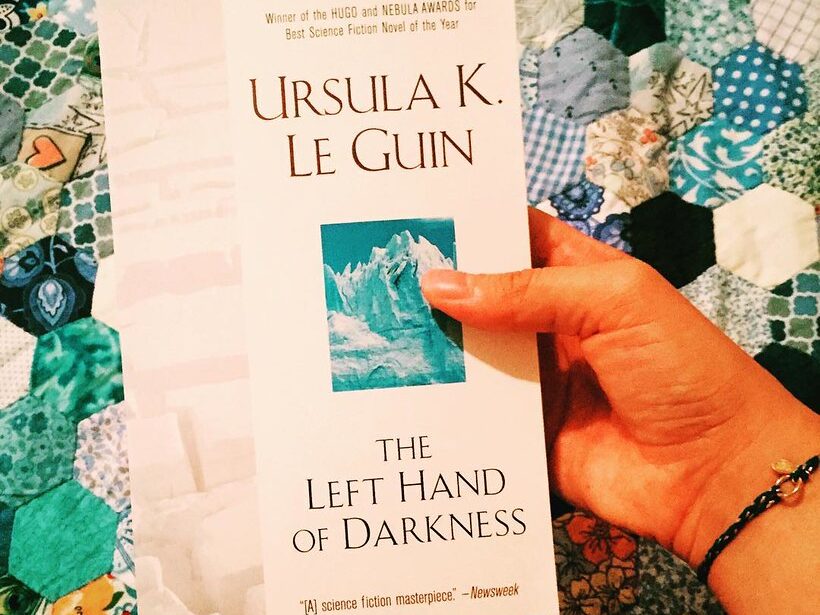
Ursula K. Le Guin’s contributions to science fiction are nothing short of revolutionary, and her novels “The Left Hand of Darkness” and “The Dispossessed” are shining examples of her prowess. Le Guin’s narratives transcend mere storytelling; they are profound examinations of culture, gender, and political systems.
“The Left Hand of Darkness,” in particular, is renowned for its exploration of a society without fixed gender roles, inviting readers to ponder the constructs that define their own worldviews.
Le Guin’s works have garnered numerous accolades, including Nebula Awards and the prestigious title of winner of the Hugo, solidifying her place among the pantheon of science fiction writers.
Her ability to construct narratives that are both alien and intimately relatable is a hallmark of Le Guin’s genius, offering a lens through which we can re-evaluate our assumptions about the world we inhabit. Her books remain essential reading for anyone seeking to understand the breadth and depth of human potential.
5. The Dan Simmons Epic: “Hyperion” and Its Sequels
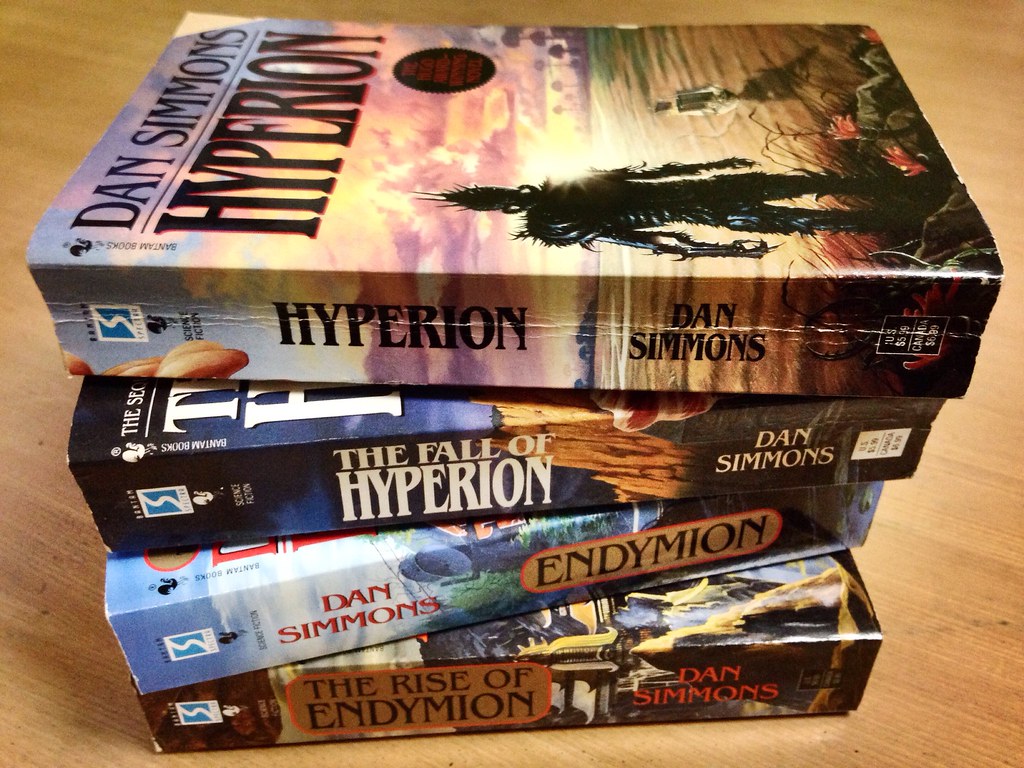
Dan Simmons’ “Hyperion” is a tour de force, an epic that melds the grandeur of space opera with the literary depth of works like “The Canterbury Tales.” The novel is a tapestry of interwoven stories, each a personal pilgrimage to the enigmatic Time Tombs, guarded by the fearsome Shrike.
Simmons’ prose is a gateway to a universe vast in its scope and rich in its mythology, where each tale is a window into the human soul set against the backdrop of an impending galactic war.
With its sequels expanding on the complex narrative, Dan Simmons has crafted a series that stands as a cornerstone of modern science fiction. The “Hyperion Cantos” traverses themes of time, memory, and the intertwining of human destinies.
Sci-Fi Novels That Mesmerize Fiction Readers
Amidst the constellation of science fiction literature, certain novels shine with the brilliant luster of recognition from their peers. These award-winning works are lauded for their innovation, storytelling prowess, and ability to capture the essence of the genre.
6. “Chain Gang All Stars: A Novel” by Nana Kwame
“Chain Gang All Stars: A Novel” is a recent entrant to the hallowed halls of Clarke Award recipients, capturing the attention of readers with its potent blend of social commentary and speculative prowess.
The narrative unfolds in a dystopian landscape where the echoes of the past collide with a harrowing vision of the future. It is a tale that speaks to the resilience of the human spirit, even as it grapples with the chains of oppression and the weight of history.
The novel’s characters are etched with precision, their struggles a mirror to the societal ills that plague our own world. As the plot weaves through the lives of the chain gang’s members, the author crafts a story that is as much a reflection on individual agency as it is a commentary on the collective human experience.
“Chain Gang All Stars” is a book that resonates with a haunting timbre, a reminder of the power of fiction to illuminate the darkest corners of our reality.
7. “The Ten Percent Thief” by Lavanya Lakshminarayan
With “The Ten Percent Thief,” readers are thrust into a world where the lines between technology and humanity blur, creating a narrative ripe with intrigue and philosophical depth.
The novel explores the consequences of advanced artificial intelligence and its impact on society, weaving a tale that is both cautionary and exhilarating. It is a journey through the ethical labyrinth of progress, questioning what it means to be human in an age of machines.
The protagonist’s journey is not just a quest for survival but a search for identity amidst the cacophony of a world transformed by science and technology. The book’s gripping narrative is a testament to the genre’s ability to explore the human condition through the prism of alternate realities.
“The Ten Percent Thief” is a standout work that captures the imagination and provokes thought, ensuring its place among the pantheon of memorable sci-fi narratives.
8. “The Mountain in the Sea” by Ray Nayler
“The Mountain in the Sea” is a breathtaking voyage into the unknown, where the depths of the ocean hold secrets that could alter the course of human destiny. The novel is a masterful blend of adventure and scientific exploration, challenging readers to confront the mysteries that lie beneath the surface.
As the characters delve into the aquatic abyss, they find more than new species; they discover truths about nature, humanity, and the delicate balance of our ecosystem. The story is a compelling mix of suspense and intellectual curiosity, a hallmark of the best science fiction.
It pushes the boundaries of the imagination, inviting readers to consider the wonders and perils of space travel beneath the waves. “The Mountain in the Sea” rises above the genre’s typical fare, offering a narrative that is as immersive as the watery world it portrays. It is a novel that entices with the promise of discovery, beckoning readers to dive into its depths.
The Hugo Awards: Celebrating Excellence in Science Fiction
The Hugo Awards are a celebration of the pinnacle of science fiction literature, honoring stories that resonate with readers and critics alike.
These awards are a testament to the genre’s ability to explore the farthest reaches of space travel, to delve into the complexity of alternate histories, and to grapple with ethical dilemmas in worlds both familiar and alien.
The Hugos recognize narratives that are not only entertaining but also reflective of the evolving dialogue between science and society. Popular authors to win this award include:
9. “A Memory Called Empire” by Arkady Martine
“A Memory Called Empire” by Arkady Martine is a dazzling space opera that embarks on a wild ride through the intricacies of empire and identity. The novel is a tapestry of political intrigue and cultural collision, as seen through the eyes of an ambassador from a small space station navigating the grandeur of a galactic empire.
Martine’s writing is a deft blend of world-building and suspense, creating a universe that is as richly detailed as it is thrilling.
The narrative captures the essence of a space opera, with its grand scale and dramatic stakes, while also offering a profound examination of memory and power. Martine’s work echoes the complexities of Roger Zelazny’s tales, where the personal and the political are inextricably linked.
“A Memory Called Empire” stands as a modern classic in the making, a novel that carries the torch of the genre’s ability to conjure awe and wonder in the hearts of its readers.
10. “The Calculating Stars” by Mary Robinette Kowal
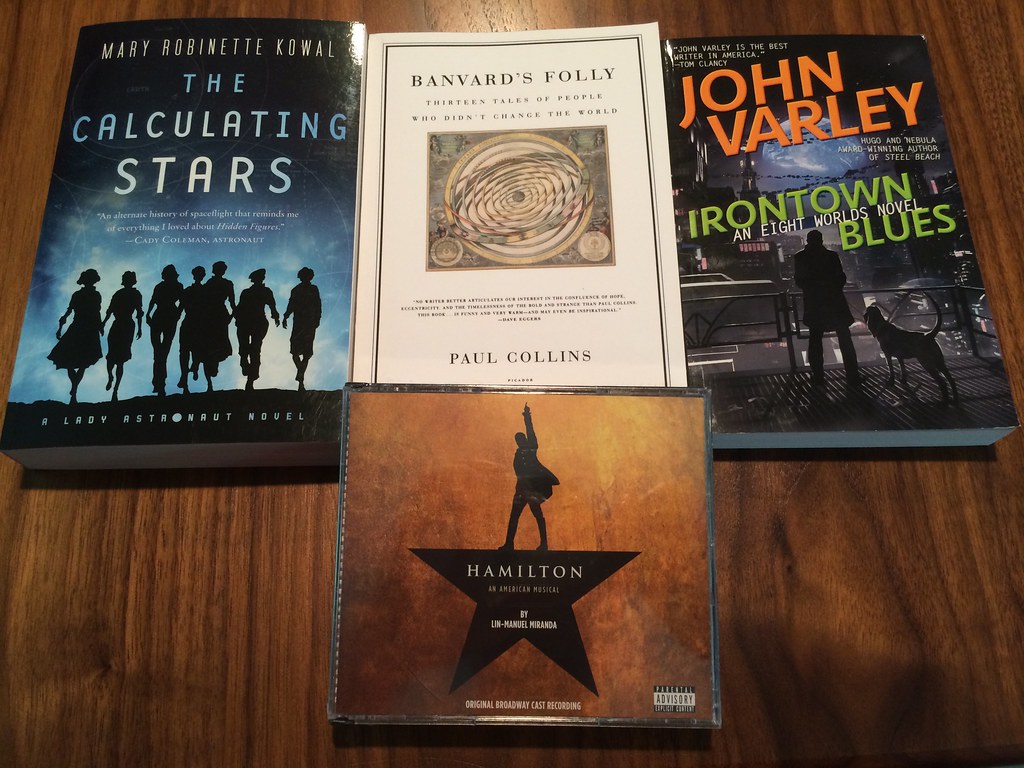
Mary Robinette Kowal’s “The Calculating Stars” is a novel that takes readers on a journey back in time to an alternate 1950s where a meteorite strike catapults humanity into a race to colonize space.
The story follows Elma York, a pilot and mathematician who dreams of becoming an astronaut in a world struggling to overcome not only the impending threat of extinction but also deeply ingrained prejudices. Kowal’s narrative is both a love letter to the space race and a critical examination of the societal barriers that hinder progress.
With its blend of accurate scientific detail and compelling human drama, “The Calculating Stars” is a standout example of how science fiction can illuminate the human experience through the lens of speculative scenarios.
The novel is a testament to the resilience of the human spirit, and its recognition as a Hugo Award winner underscores the impact of stories that inspire us to reach for the stars, no matter the obstacles. Kowal’s work is a beacon for readers and dreamers alike, a reminder that the journey toward a better future is paved with determination and hope.
The Best Sci-Fi Book Series to Get Lost In
Embarking on a science fiction series is akin to setting off on an epic journey, much like the quest within the “Lord of the Rings.” Readers become part of complex worlds, expansive narratives, and character arcs that span across galaxies and time.
From the political machinations of interstellar governments to the personal growth of a lone protagonist, these series offer a depth and continuity that standalone novels often cannot match.
11. The Futuristic Intrigue of “The Expanse” Series
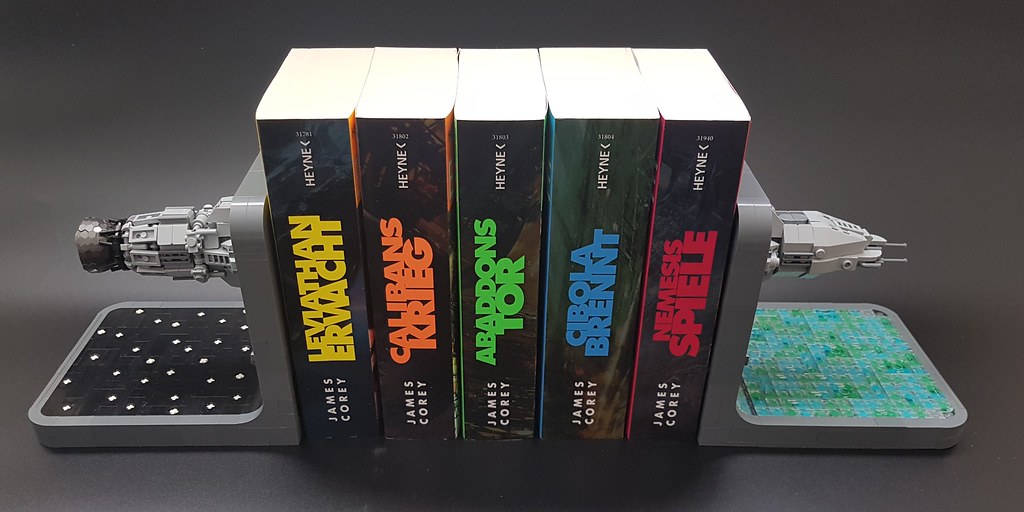
“The Expanse” series, written by James S.A. Corey, is a modern space opera that offers a wild ride through a colonized solar system fraught with political tensions and alien technology.
Much like the works of Roger Zelazny, the series seamlessly blends elements of mystery, political intrigue, and a richly imagined future that keeps readers on the edge of their seats. The story arcs are immense, the stakes are high, and the characters are deeply human, all set against the vast backdrop of space.
At its heart, “The Expanse” is about the resilience of humanity in the face of the unknown. As the series progresses, the complexity of the interstellar setting grows, encompassing everything from the gritty reality of asteroid mining to the grandeur of alien civilizations.
The novels invite readers to explore what it means to be human when humanity itself is stretched across the stars, making them a must-read for any fan of the genre.
12. Jeff VanderMeer’s “Southern Reach Trilogy” and the Lure of the Unknown
The “Southern Reach Trilogy” by Jeff VanderMeer is a collection of sci-fi novels that evoke a sense of the dying earth genre, where nature reclaims what was once its own. These books skirt the boundaries between science fiction and fantasy novels, creating an unsettling and surreal experience that delves into the human psyche.
The trilogy explores the mysterious Area X, a zone cut off from civilization and governed by rules that defy understanding—a place where the familiar becomes alien. VanderMeer’s prose is lush and vivid, drawing readers into a world where every discovery uncovers layers of deeper mysteries.
As the characters confront the unknown and face the implications of their own humanity, the books challenge preconceived notions of what sci-fi novels can be. The trilogy stands as a beacon for those who crave stories that are not just about technology and the future but also about the timeless human struggle to understand the unexplainable.
13. The Timeless Appeal of “The Foundation Series” by Isaac Asimov
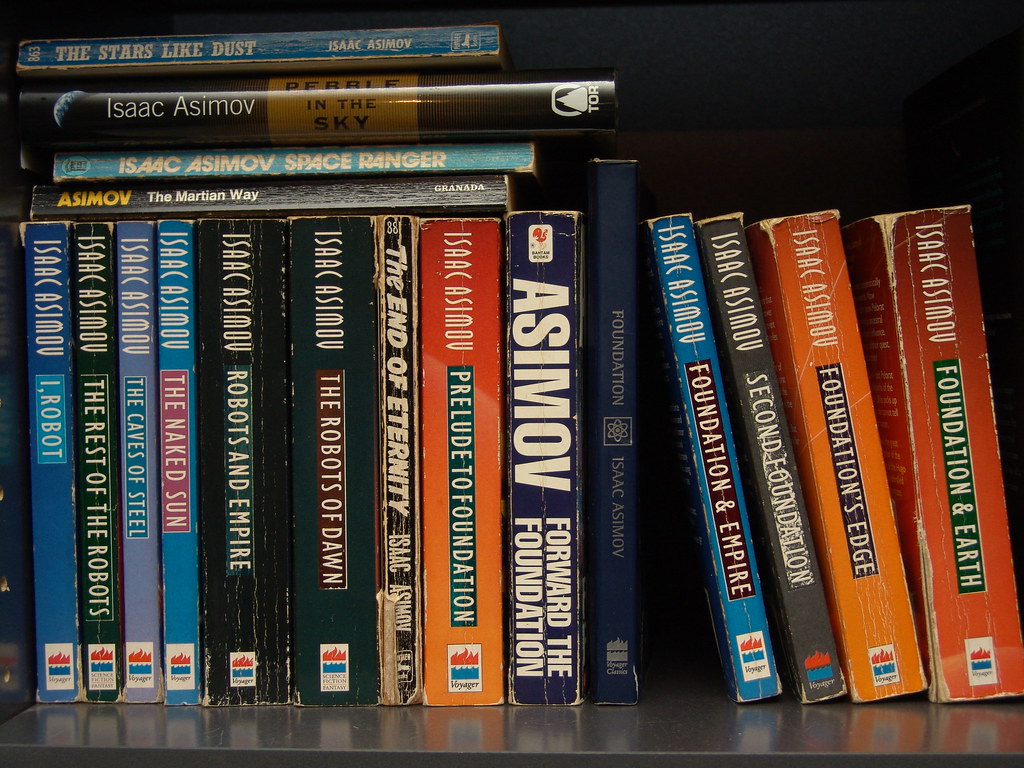
Isaac Asimov’s “Foundation Series” is a cornerstone of the science fiction genre, a testament to the enduring appeal of grand narratives and intricate world-building. The series begins with the premise of a mathematician who predicts the fall of a galactic empire and the dark age to follow.
Through this visionary lens, Asimov explores themes of civilization, power, and the forces that shape history. The books, spanning centuries, offer a profound look at the cyclical nature of societies and the potential for science to illuminate the path ahead.
The “Foundation Series” is a tapestry of human experience set against the vast expanse of the cosmos, a narrative that asks readers to consider the bigger picture. Asimov’s work is not just about the science of the future; it’s about the philosophical questions that confront every generation.
His legacy is one of intellectual curiosity and the belief in humanity’s ability to reason and to adapt, making the “Foundation Series” a beacon for readers who seek both entertainment and enlightenment.
14. The Vorkosigan Saga: A Character-Driven Space Opera
Lois McMaster Bujold’s “Vorkosigan Saga” is a space opera that expertly weaves elements of sci-fi and fantasy into a narrative tapestry as rich and complex as any fantasy novel.
Focusing on the life of Miles Vorkosigan, a physically disabled aristocrat turned interstellar spy and mercenary, the series is celebrated for its character development and emotional depth.
The space opera genre is elevated by Bujold’s attention to the personal struggles and triumphs of her characters, set against a backdrop of galactic conflict and societal change.
What sets the “Vorkosigan Saga” apart is its human-centric approach to the grand scale of space opera. Readers are invited to journey through a well-constructed universe where the science fiction elements serve to challenge and define the characters.
Modern Sci-Fi Gems for Contemporary Readers
For the contemporary reader, the landscape of science fiction is richer and more diverse than ever before. Books like “The Three-Body Problem” by Liu Cixin have pushed the boundaries of the genre, exploring complex scientific concepts through the lens of fiction.
These modern sci-fi gems captivate with their originality and intellectual rigor, offering a fresh perspective on classic themes.
15. “Annihilation” by Jeff VanderMeer: A New Age Classic
Jeff VanderMeer’s “Annihilation,” the first novel in the “Southern Reach Trilogy,” emerges as a new age classic, melding aspects of horror and science fiction into a mesmerizing tale of discovery and transformation.
The novel follows a team of scientists as they venture into Area X, a mysterious and uninhabited region where the laws of nature have gone askew. VanderMeer’s prose is atmospheric and haunting, inviting readers to question the very fabric of reality as the expedition’s journey descends into the surreal.
The strength of “Annihilation” lies in its ability to blur the lines between the natural world and the alien, between the familiar and the utterly strange. VanderMeer’s storytelling is a masterclass in suspense and the slow reveal, drawing readers in with each page.
The novel stands as a beacon for those seeking stories that are not only thrilling but also deeply reflective of the human condition and our place within the universe.
16. The Cultural Phenomenon of “The Martian” by Andy Weir
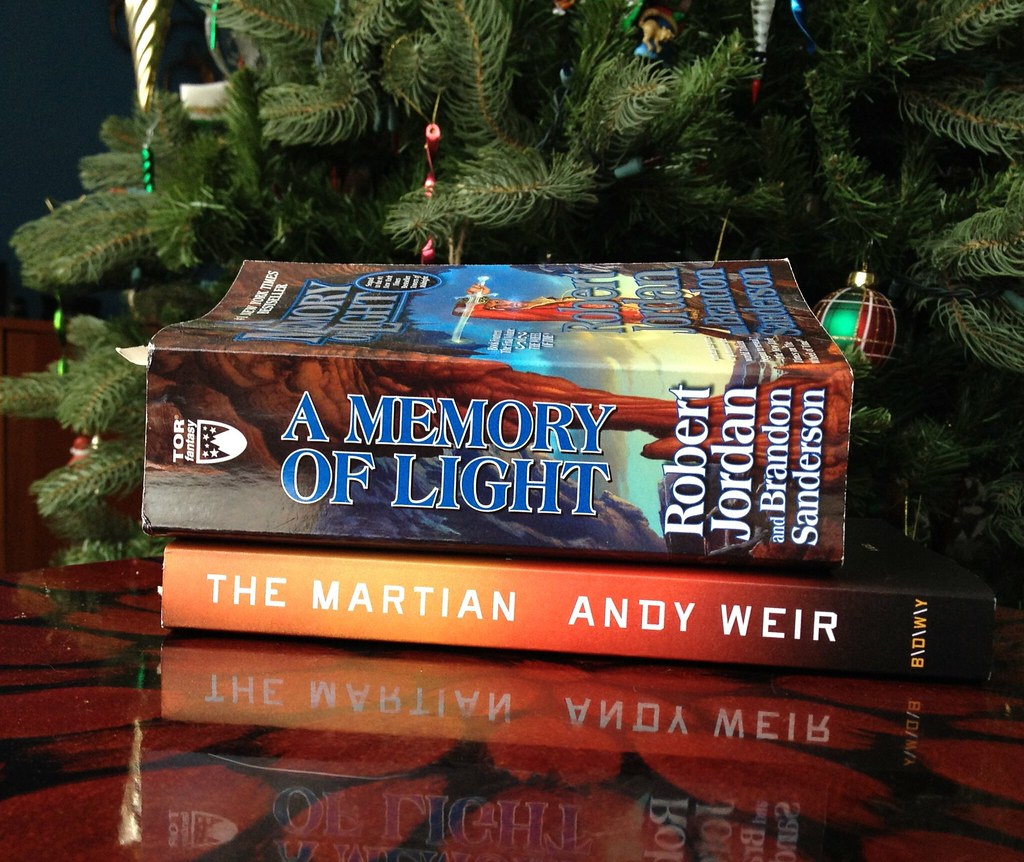
“The Martian” by Andy Weir has transcended its pages to become a cultural phenomenon, capturing the imagination of readers and viewers alike. The story of astronaut Mark Watney’s survival on Mars is a testament to the human will and the ingenuity required to overcome insurmountable odds.
Andy Weir’s meticulous research and attention to scientific detail provide a sense of authenticity that grounds the novel in reality, while his wit and humor make the dire situation of the protagonist relatable and engaging.
The success of “The Martian” is not solely due to its gripping narrative; the book also sparked conversations about the future of space exploration and the possibility of human colonization of other planets.
Weir’s novel is an inspiration for those who look to the stars and dream of what might be, making it a must-read for anyone with an interest in science fiction that both entertains and educates.
17. The Dazzling World of “The Three-Body Problem” by Liu Cixin
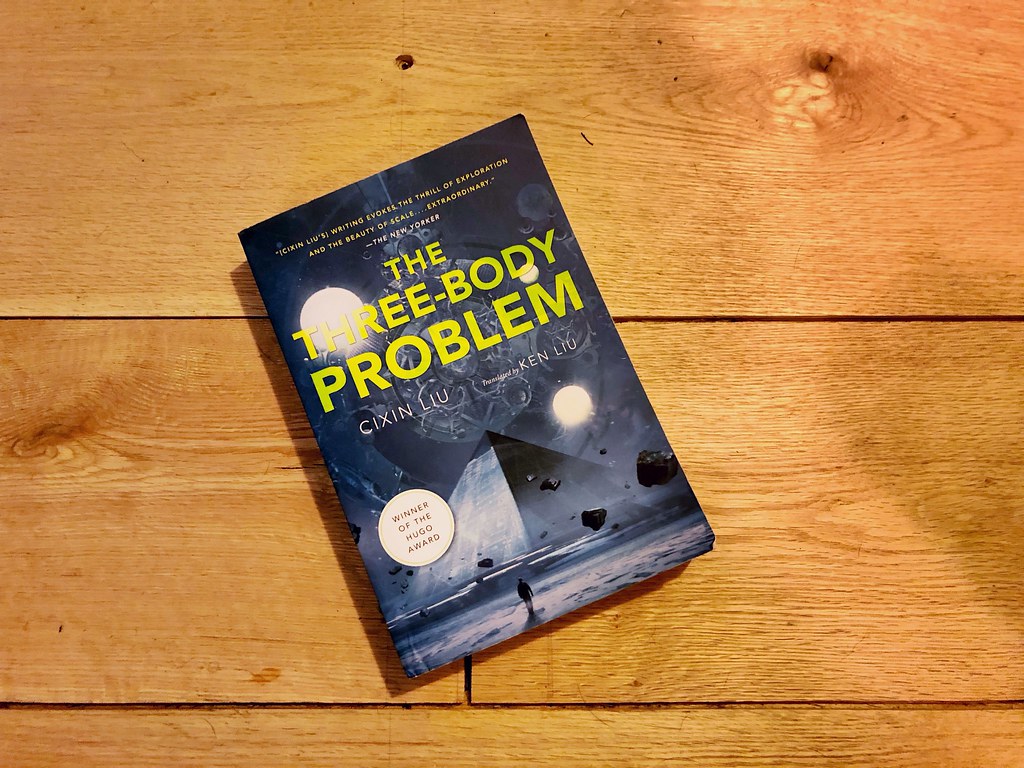
Liu Cixin’s “The Three-Body Problem” is a tour-de-force that introduces readers to a dazzling world where physics and philosophy intertwine. The novel begins with a secret military project during the Cultural Revolution and expands into a first-contact story that spans civilizations and challenges the limits of human knowledge.
Liu’s intricate plot and complex characters have earned the novel international acclaim, setting a new standard for what science fiction can achieve. “The Three-Body Problem” is not simply a novel; it’s a cerebral experience that asks readers to grapple with the implications of advanced technology and the existence of extraterrestrial life.
The book’s success lies in its ability to combine hard science with a compelling narrative, making it a cornerstone of modern science fiction literature. For those seeking a story that is both intellectually stimulating and deeply human, “The Three-Body Problem” is a work not to be missed.
18. “The Shadow of the Torturer” – The New Wave of Literary Sci-Fi
Gene Wolfe’s “The Shadow of the Torturer” represents the new wave of literary science fiction, a genre that marries the speculative elements of sci-fi with the stylistic prose of literary fiction.
The novel, the first in “The Book of the New Sun” series, follows the journey of Severian, an apprentice in the torturer’s guild, as he traverses a far-future Earth. Wolfe’s richly detailed world and complex narrative structure challenge readers to piece together a puzzle that spans time and memory.
Wolfe’s work is a testament to the depth and versatility of science fiction as a literary form. “The Shadow of the Torturer” invites readers to explore themes of power, redemption, and the nature of reality, all woven into a story that transcends the traditional boundaries of the genre.
For those who appreciate novels that not only entertain but also provoke thought and discussion, Wolfe’s masterpiece is an essential read.
Standalone Sci-Fi Novels Worth Your Time
While the series offers the chance to dive deep into expansive worlds, standalone sci-fi novels provide powerful narratives that can be experienced in a single, concentrated sitting.
These singular works often leave a lasting impact, offering innovative ideas and thought-provoking concepts that linger long after the final page.
19. “Blindsight” by Peter Watts: A Philosophical Space Thriller
Peter Watts’ “Blindsight” is a philosophical space thriller that delves into the depths of consciousness and what it means to be sentient. The novel follows a crew of enhanced humans and a vampire sent to investigate an alien presence in the outer solar system.
Watts’ exploration of the nature of intelligence and self-awareness is as chilling as it is profound, offering a unique take on first-contact scenarios. With its hard science underpinnings and a narrative that questions the very essence of human nature, “Blindsight” is a standout in the science fiction genre.
The book’s cerebral approach to storytelling sets it apart, making it a must-read for those who enjoy their space adventures with a heavy dose of introspection and philosophical musing.
20. The Unique Visions of “Permutation City” and “Stand on Zanzibar”
Greg Egan’s “Permutation City” and John Brunner’s “Stand on Zanzibar” are novels that offer unique visions of the future, both exploring the intersection of technology and human nature.
“Permutation City” delves into the implications of consciousness and the digital realm, while “Stand on Zanzibar” examines the societal impacts of genetic engineering and overpopulation. These standalone works are renowned for their prescient insights and complex world-building.
Both novels challenge readers to consider the consequences of humanity’s technological advancements and the ethical considerations that arise from playing god with the fabric of life. They are essential reads for those interested in science fiction that not only entertain but also provoke deep reflection on the direction of our species and the future we are creating.
21. The Psychological Depths of “Do Androids Dream of Electric Sheep?”
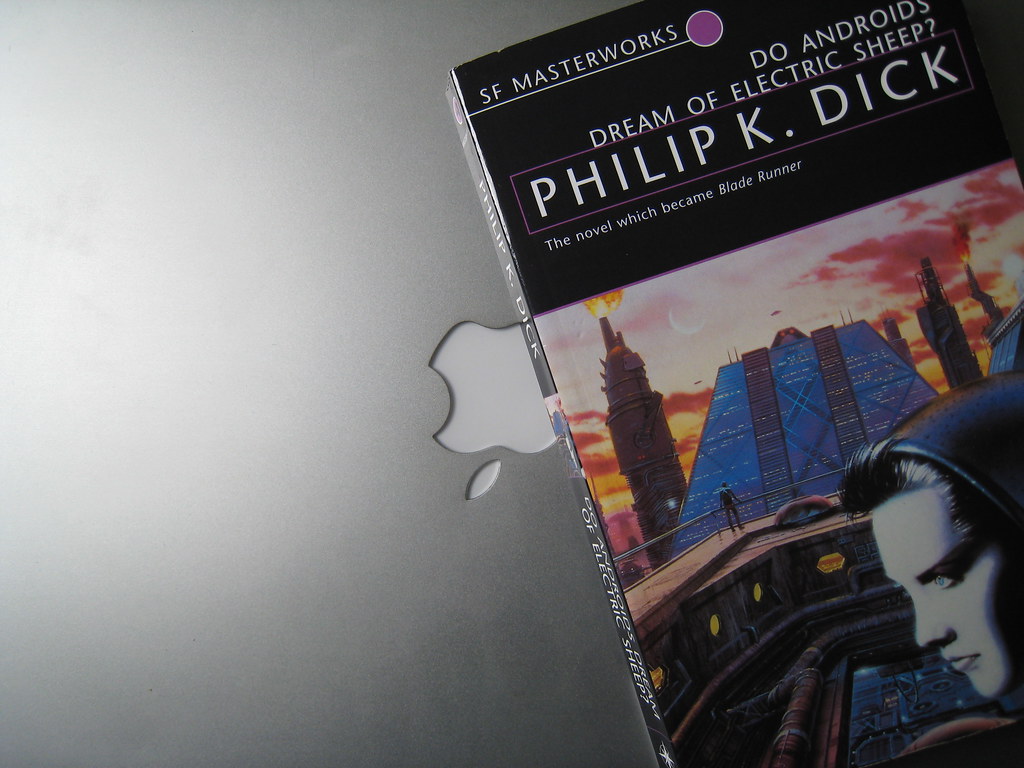
Philip K. Dick’s “Do Androids Dream of Electric Sheep?” is a seminal work that explores the psychological depths of artificial intelligence and what it means to be human. The novel, which inspired the “Blade Runner” films, introduces readers to a post-apocalyptic San Francisco where Rick Deckard hunts rogue androids.
Dick’s masterful blend of noir detective elements with a dystopian setting creates a haunting vision of the future that resonates with contemporary readers. The novel’s influence extends beyond literature into TV shows and films, making it one of the best series adaptations in recent history.
“Do Androids Dream of Electric Sheep?” challenges readers to question the nature of empathy and the blurred line between man and machine. It remains a cornerstone of science fiction literature and a compelling study of identity in a world where technology can mirror and possibly surpass human capabilities.
Sci-Fi Books That Push the Boundaries of the Imagination
Science fiction has the power to take readers on journeys beyond the ordinary, pushing the boundaries of the imagination much like the epic “Lord of the Rings.” These stories transport us to distant worlds, explore the edges of possibility, and confront us with questions about our own reality.
They invite us to consider not just the future of technology, but the future of humanity itself.
22. “The Windup Girl” – A Stunning Take on Bioengineering
Paolo Bacigalupi’s “The Windup Girl” envisions a world ravaged by genetic engineering and depleted resources, offering a cautionary tale that resonates within the climate fiction subgenre.
In the bustling streets of Bangkok, artificial life forms known as “windups” serve humanity, embodying the ethical quandaries of biotechnology. Bacigalupi weaves a narrative that challenges readers to consider the consequences of our current trajectory with the environment, making “The Windup Girl” a must-read for those interested in the intersection of science fiction and ecological issues.
The novel’s protagonist, a genetically engineered “New Person,” is a testament to Bacigalupi’s ability to craft characters that capture the heart of human struggle within a biotech-dominated society.
As she navigates a landscape of corporate greed and environmental collapse, readers are immersed in a future that feels alarmingly plausible. The book’s exploration of bioethics and corporate power not only entertains but also sparks important conversations about our future on this planet.
23. “Nexus” by Ramez Naam: The Nexus of Human and AI
Ramez Naam’s “Nexus” presents a thrilling dive into the fusion of human cognition with artificial intelligence, where a revolutionary nano-drug links minds, transforming the way humans interact.
The story unfolds in a near future where such a connection could mean the dawn of a new epoch or lead to catastrophic warfare. Naam, with his background in technology and innovation, crafts a gripping narrative that examines the potential and perils of human enhancement, questioning the very essence of humanity itself.
The characters in “Nexus” are entangled in a global conspiracy, pushing the boundaries of what it means to be human. As they grapple with the implications of merging with AI, the novel becomes a lens through which we explore the ethical and societal impacts of such technological advancements.
“Nexus” is a thought-provoking read for anyone fascinated by the future of the human race and our relationship with technology, making it a standout in the realm of science fiction.
24. “Stories of Your Life and Others” by Ted Chiang: Sci-Fi That Makes You Think
Ted Chiang’s anthology, “Stories of Your Life and Others,” is a collection of best sci-fi narratives that delve deep into human stories. Each tale captivates with its philosophical depth and scientific rigor, inviting readers to ponder profound questions.
With “Story of Your Life,” which inspired the film “Arrival,” Chiang explores the nature of language and time, demonstrating his unique ability to blend speculative fiction with heartfelt human experience.
Chiang’s work stands out for its meticulous construction and emotional resonance. His stories often leave readers with lingering thoughts about the choices that define us and the paths we take. This anthology is not merely a set of stories but a journey through the possibilities of science fiction, encouraging introspection and a deeper understanding of the world around us.
The Best Hard Science Fiction Books for the Analytical Mind
For readers seeking literature that combines scientific accuracy with imaginative storytelling, hard science fiction is the perfect genre. Books like Arthur C. Clarke’s “2001: A Space Odyssey” and Isaac Asimov’s “Foundation” series stand as pinnacles of this genre, offering tales that are as informative as they are entertaining.
Andy Weir’s “The Martian” captivates with its meticulous attention to the science of space travel, while “Station Eleven” explores the aftermath of a pandemic with a focus on human resilience. These books are more than just stories; they are explorations of what could be, grounded in what is scientifically plausible.
25. “A Mission of Gravity” – A Study in Gravity and Humor
In “A Mission of Gravity,” author Hal Clement combines hard science fiction with a sense of humor to explore the physics of a massive, high-gravity planet. The story centers on an alien species perfectly adapted to their extreme environment, offering a unique perspective on life and intelligence.
Clement’s attention to scientific detail and his imaginative portrayal of an alternate world’s physics make this novel an engaging read for those with an analytical mind. The novel is not only an adventure in astrophysics but also a charming exploration of intercultural communication and understanding.
As the alien protagonist embarks on a mission to recover a valuable scientific probe, readers are treated to a story that is as much about the science of gravity as it is about the gravity of situations and the levity needed to overcome them. “A Mission of Gravity” is a classic that remains influential and beloved in the hard science fiction genre.
26. Greg Egan’s “Diaspora”: A Vision of Post-Human Futures

Greg Egan’s “Diaspora” envisions a world where humanity has transcended its biological roots, existing in a variety of post-human forms, from digitized consciousnesses to genetically modified beings designed for space.
Egan’s exploration of such a future is a rigorous thought experiment that stretches the limits of the imagination while remaining grounded in plausible scientific concepts. As the characters navigate existential threats and the vastness of the cosmos, the novel raises questions about identity and the definition of life.
“Diaspora” stands out for its ambitious scope and the depth of its world-building. The novel’s narrative traverses astrophysical phenomena and virtual realities, examining the potential paths of human evolution. Egan’s work is a testament to the power of hard science fiction to not only entertain but also to stimulate intellectual curiosity and philosophical debate.
The Best Space Opera Books to Fuel Your Starship Fantasies
Space opera, a subgenre that melds the grand scale of sci-fi with the drama of opera, offers sweeping narratives set against the backdrop of outer space. These stories often feature heroic journeys, complex political landscapes, and vibrant alien cultures.
For fans of both sci-fi and fantasy, space opera books are the perfect escape, providing the excitement of space battles and the depth of character-driven plots.
27. “The Pride of Chanur”: Interstellar Politics and Alien Cultures
C.J. Cherryh’s “The Pride of Chanur” is a captivating entry in the space opera genre, highlighting the complex interplay of interstellar politics and alien cultures. The story follows a crew of lion-like aliens who find themselves entangled in a dangerous political game after rescuing a human stranded in space.
Cherryh’s world-building skills shine as she crafts a universe filled with diverse species, each with its own distinct cultures and societal structures. The novel is a thrilling examination of diplomacy and conflict among the stars, offering a rich tapestry of interactions that mirror the complexity of real-world international relations.
As the narrative unfolds, readers are treated to a story that is not only a space-faring adventure but also a profound exploration of the nature of communication and the bonds that can form across the vastness of space.
28. “Leviathan Wakes”: The Beginning of an Interstellar Saga
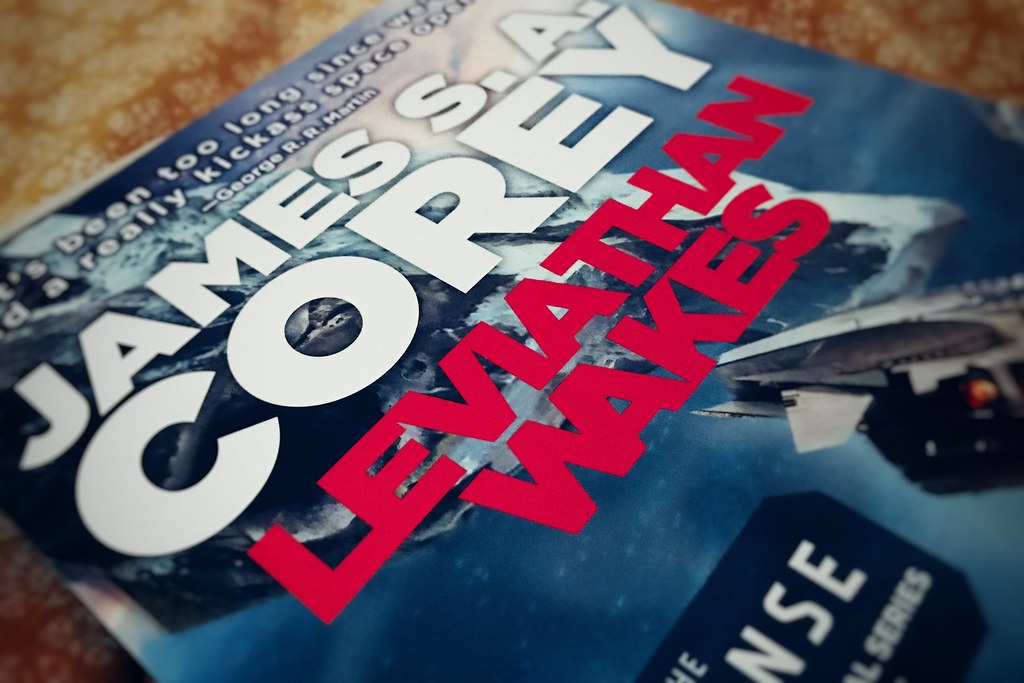
“Leviathan Wakes,” the first book in the acclaimed sci-fi book series “The Expanse” by James S.A. Corey, ignites a sprawling saga that has since expanded into popular TV shows. Set in a future where humanity has colonized the solar system, the novel intertwines the stories of a weary detective and a ship’s officer as they unravel a conspiracy that threatens human existence.
With its gritty realism and complex characters, “Leviathan Wakes” ushers readers into a world of political intrigue and interplanetary tension. Corey’s skillful world-building and fast-paced storytelling have earned “The Expanse” series a dedicated following.
The blend of noir elements with space opera grandeur creates a gripping narrative that hooks readers from the first page and doesn’t let go. As the characters face the darkness of space and the darker aspects of human nature, “Leviathan Wakes” sets the stage for an epic journey through the cosmos.
Conclusion: Your Gateway to the Universe of Best Sci-Fi Books
Whether you’re searching for a space adventure set among the stars, historical fiction with a sci-fi twist, or the latest New York Times bestselling sensation, the universe of best sci-fi books offers an escape for every imagination. If you’re drawn to epic space sagas filled with heroes, empires, and intergalactic intrigue, don’t miss the best Star Wars books, a perfect starting point for exploring one of the most beloved sci-fi universes ever created.
As you close one book and open another, you continue an unending journey through the fantastic and the visionary. Find your next read among these innumerable worlds, and let the best sci-fi books be your gateway to adventures that transcend time and space. And if you’re ready to blend futuristic action with gripping espionage, check out the Orphan X books, a high-tech thriller series that bridges the worlds of science fiction and suspense.

